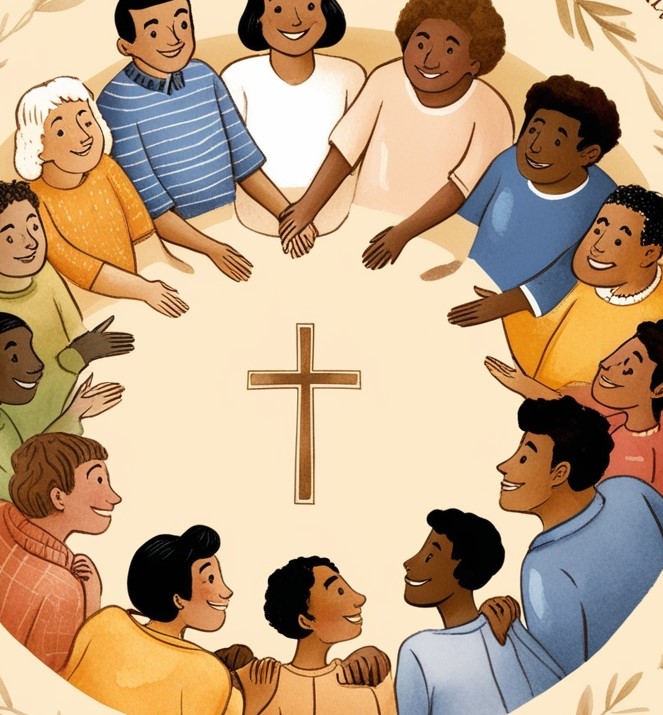
Text: Mark 10:2-16
Theme: “Relationships”
______________________________________
Intro – Some time ago, a political add showed an actor sitting in a chair and talking to an empty chair in front of him. The other chair was supposed to be of his candidate’s opponent. The actor talked to the empty chair is if the opponent was there, but it was actually a monologue. The idea was clear: the opponent doesn’t need, doesn’t deserve or just can’t be listened to. He need only to hear the truth, and to accept it.
Strange? I don’t think so. It is not uncommon to watch that trend unfold in daily life: to talk to others in an unilateral way. If you look around, you’ll see there’s always more people ready to talk than to listen. Sometimes in daily relationships, we may also be guilty of talking to empty chairs. For, as we know, if people around us pay attention to what we say, understand it well, agree with it and do as told, the problem is solved. Right?
1 – Empty chairs
Relationships. The texts for today compel us to look at this subject, especially when Jesus talks about marriage and divorce. But we can think of relationships in a broader sense, since Adam and Eve, as the very first human beings, inaugurated not just the relationship in a marriage but relationships themselves.[1]
But that was paradise, where everything was perfect. We know what, unfortunately, happened next: the rupture of the relationship with God and, consequently, with others, ourselves, and nature. Separation. Which leads to thin connections, brokenness and loneliness.
This sounds all too familiar. In an era of hyper-connection, the hyper-fracture of relationships and connectedness is self-evident. This is a time when I might have contacts in Japan but be unknown to my neighbor. I could have 1600+ Facebook friends, yet no real connection with almost anyone. I can have real relationships near me that I don’t foster as I should, while I live in the anxiety of pleasing people that I barely know.
This issue permeates various aspects of relationships, and it gets to marriage too. I will get to some comments about marriage and divorce later. Otherwise, some of you might go like, “Oh, Pastor is only addressing those who are connected to marriage interests. I don’t need to think about relationships with my child, my job, or my colleagues…I’ll take the chance to read the bulletin.” The hardness of heart Jesus addresses in the Gospel speaks to all of us.
I think that the empty chair illustration can help us to reflect about our relationships. From the political add mentioned earlier we saw the “I speak, you listen” approach. “You are wrong, and you surely don’t even have good reasons to justify your being wrong.” This may be the way we sometimes act towards our spouse, child, boss, employee, friend, acquaintance, and against someone who thinks differently. “Sit down and listen, cause I have lots to say”. Then, we lose precious opportunities to understand and create deeper connections, even, and especially, with those with whom we disagree or that have ideas for life different than ours.
2 – Redemption
The problem is: that is hard. Really hard. To listen, to really try to deeply understand (perhaps because we think that if the listen carefully, we have to agree, which is not always agree). It is hard to listen deeply our spouse, our friend, our co-worker. Especially when someone has ideas that may differ from ours.
It’s hard. That’s why we don’t do it as frequent as we could. Hardness of heart. Sin is present, and prevents us to do so. We want to speak first, we want to be understood first, we want to be right, so that our internal insecure world is not shaken by perceptions that might move us in the to reflect, and perhaps even change what needs to be changed.
Now, what would have happened if God did that to us? What if He would look to our “empty chair” and started to speak:
-You do not fulfill the Law;
-You don’t love your spouse as you should;
-You are not as good as a parent as you should; I can give you a long list of your mistakes;
-You don’t work as hard as you should;
-You think too many bad thoughts;
-You talk about others behind their back;.
I think I better stop here, or I won’t finish my sermon before 5PM.
He is the One who can act so because He would be absolutely right. He actually does that in His Word. But He didn’t. God does show our problems in our relationship, but he is not waiting for justifications on what we did. He justified us instead. He sent His only Son, which “sat here in your place” and took the sin upon Himself. He had perfect relationships, he fulfilled all the Father’s expectations, He redeemed us, rebuilding our relationship with God by His death on the Cross. – a relationship lost by Adam and Eve, and everybody since then, shortly after our Genesis reading for today.
In Christ, God looks at us differently. He listens to us in a different way. He accepts our repentance, forgives us, and leads to a life of praise, prayer, and fruits from this wonderful relationship with Him, and the relationships He provides us with in our lives. As He did with Adam, He gets our life rid of loneliness. We have company. We have relationships!
He did this so we can have his love impacting our relationships: Parent and child, Friends, Siblings, strangers. And spouse.
3 – Marriage and Divorce
The relationship mentioned in the Gospel today is marriage, and the breaking of it, divorce. The Pharisees approached Jesus and thought they would trap Him with the question regarding divorce. At that time, there was one rabbinic school that allowed for divorce only in cases of adultery, while another permitted divorce for any reason. So here is the catch 22: if Jesus opposes divorce, He’ll upset many; but if He sides with one of the rabbinical schools, He’ll lose credibility.
At this point, Jesus doesn’t allow the Law limit Him, especially because there were additions to the Old Testament made by rabbis along the way. He goes way back into Genesis, Creation: God created man and woman. “Therefore, what God has joined, let no one separate.” Marriage is a divine institution that is meant to be for life, with many blessings attached to it, and divorce breaks God’s will.
Now, talking about marriage and divorce in a society where average marriage time before divorce is 14 years, or less, and where we are invited to normalize brokenness divorce brings as a right can be sensitive and challenging territory. As a Christian Church though, we continue to undertake this challenge, in truth and love, sharing God’s counsel:
-For those preparing to marry: In God’s eyes, marriage is for life. Yes, it truly is. I know that “for life” was different in the past, where you got married, say, when you were 20 and died when you were 40 or 50, while today you may live up to a 100+ years. Also, that sometimes we like to turn affirmations into questions, (Married for life? Really?) – perhaps to evade the core truth. But divorce is not God’s plan; it is a human attempt to rectify or lessen the impact of poor decisions.
-For those already married: Remember, marriage is more important than our narcissistic drive to have your desires satisfied. God genuinely desires for you to remain married, to understand that your marriage will face problems, losses, and challenges. But the person beside you was placed there by God. The marital union is profoundly significant.[2]
-For the situations where divorce has happened: Divorce is not part of God’s plan; it is a sin against His Will and a generator of hurt and pain.[3] However, God is not a God who abandons us. He comes close and forgives, when true repentance and faith are present. Just like he does with every other sin, Jesus forgives, restores, and helps.[4]
Jesus says that divorce is not something normalized before God. Therefore, divorcing is not a “right” from the Christian perspective but something that breaks the original order of Creation. We understand though that there are some situations in which remaining married could lead people to live and commit more sin that if they must make the hard decision of breaking up. Also, in situations where violence and abuse are involved the Church acknowledges the unfortunate necessity of divorce. So, while the Church can and should continually reach out with the message of repentance and the forgiveness and reconciliation, it must do so with the recognition that this may not lead to marital reconciliation and restoration. Wherever divorce occurs, those who suffer it are not to be driven away, but ever drawn toward Christ and His Love. That is even more the case when one who has suffered divorce has done so rather than to suffer violence against his or her life.
Our bottom line is, when we talk about divorce as Christians we don’t take it lightly as if to say: if there is problem, even little problems, “get a divorce and move on”. We will always work to have divorce to be the last, not first resource in a relationship.[5]
So, it is important to underline that there is forgiveness. There is new beginning. There is hope and there is peace promised by Christ. Sin may cause brokenness, but Christ’s forgiveness restores our wholeness. Also, this is a reminder that relationships are hard to foster. The closer, the harder. Here is why we need Jesus. We need Word and Sacraments. For Hebrews told us today, “Hebrews 2:18, For because he himself has suffered when tempted, he is able to help those who are being tempted.” (ESV) In Him we find comfort, restoration and starting over again. For those among us who have experienced divorce, we can remember that they are not below or above any of us. We are all sinners in need of God’s Grace. What sin breaks apart, Christ binds together.
4 – Connected relationships
Now, when we think about our relationships as a whole in our life, here’s another way of thinking of the empty chair. There are counsellors who set the same setting of that political add and ask: “If the person you have a problem with was sitting right here in this chair, what would you say to him or her?” This changes the approach. Now I have to speak as if the other person was present in the room. This will probably impact my choice of words, inflexion of voice and precision of gestures. I still can say exactly what I want, of course; but in a way that takes into consideration the person who is listening to it.
But we could go deeper. We could go and sit down in the empty chair. We can try to listen and observe and see things from their perspective. This way we can be eyes and ears of Christ, fostering relationships with care, compassion and love. No empty chairs, but speaking and listening. This doesn’t mean we have to abandon truth in behalf of relationships and agree with everything, even inside family. But still, listen and foster them. That is the best way to keep the channel open for a relationships guided by God’s wisdom and Love.
Cc – Christ took our place – on the Cross, so that we could enter a perfect and blessed relationship with God through faith. This love from Him is the motivation and the strength we have to foster our relationships in a God pleasing way. To speak, and to listen; to help; to be there. Sometimes, even to be silent. But we will avoid empty chairs. Unless if we want to take them as an opportunity to seat side by side with people, showing the love of Christ for us and for them in every relationship He has blessed us with.
__________________________________________
[1] They were the first to be confronted to the reality of the otherness, and the need to connect. As God said, “it is not good that man is alone”. Here you might say, “hold on pastor, didn’t God say “it is good” after He created all things? Yes, He did. However, the “not good” here is not a synonym of bad, but indicates something that is not complete, whole. Therefore, God Himself introduces the concept of otherness—of relationship, as something that is good.
[2] Some say the strongest bond is between a mother and child, but that is the second strongest. The first is between husband and wife, as the Bible tells us they become one flesh.
[3] There are a few specific conditions where the Bible says we can obtain divorce (mainly unfaithfulness and abandonment), but it is an option, not a commandment.
[4] More on the topic: https://www.projectwittenberg.org/pub/resources/text/wittenberg/mosynod/web/divrem-2.html
https://www.lcms.org/about/beliefs/faqs/lcms-views#family
Divorced persons and people seeking to remarry should demonstrate a contrite heart and a desire to receive forgiveness and restoration. As absolute as Scripture is about divorce, the Bible also confidently speaks about the power of Jesus to bring forgiveness and restoration into the kingdom of heaven. Where reconciliation and restoration of a broken marriage is not possible, remarriage becomes a possibility. These situations require unique pastoral care as we apply God’s condemnations of sin and God’s promise of delivering forgiveness of sins into the world through Jesus Christ.
[5] One of the unfortunate situations we see in our day is that people facing problems in their marriage are encouraged to end their marriage and start over again as one of the first options even by Christian friends.






